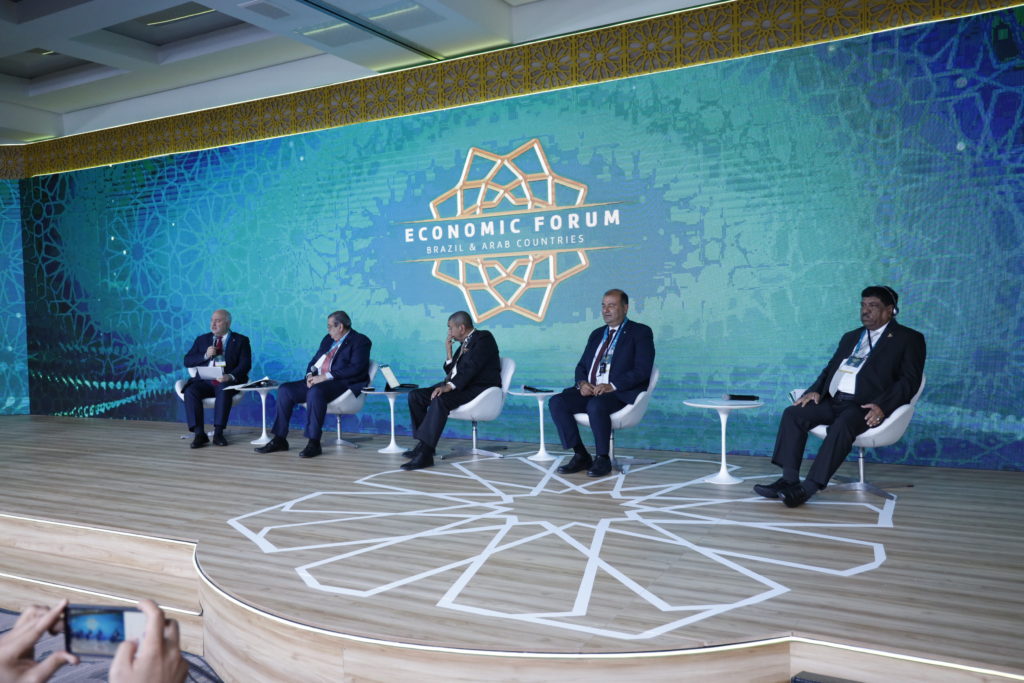São Paulo – The potential of the Arab world and Brazil’s role in South America are still not fully explored regarding relations between Brazilians and Arabs. The reflection was made by Khaled Hanafy, secretary-general of the Union of Arab Chambers (UAC), who spoke at one of the panels of the Economic Forum Brazil & Arab Countries this Monday (4) in the city of São Paulo.
Hanafy stressed the connection could go beyond business numbers. “I know the importance of numbers, but they traditionally talk about trade volume. Quantitatively, Brazilian and Arab exports are just traditional trade. We must work to modify and transform into commercial relations targeting each other’s market for a strategic partnership,” said the secretary-general of the UAC.
Other executives who participated in the debate thought the same. For Na’el Raja Al Kabariti, president of the Jordanian Chamber of Commerce (JOCC), it is necessary to think more about the future of Jordan’s relations with Brazil beyond trade. “The reason for this meeting is to boost this relationship [Brazil and Arab countries], increase opportunities, and reinforce the role of business people, their participation, and the role of governments. The world is no longer the same, and we need to face this different world. We need to be partners and move from this import-export relationship; we need strategic partnerships,” said Kabariti.
Mouddar Khouja, secretary-general of the Austro-Arab Chamber of Commerce, moderated the panel. “During the pandemic, challenges arose, and we need to adapt to these changes and ensure more growth,” said Khouja, reminding of the recent increase in energy and food prices due to the war in Ukraine.
For the president of the Oman Chamber of Commerce and Industry (OCCI), Redha Juma Al Saleh, Brazil-Arab relations are sound and have progressed in recent years despite the challenges. “But I think we still have opportunities to increase these figures,” he pointed out.
Al Saleh also recalled there are already 16 Brazilian companies operating in the country and the opportunities are more significant. “We carry a promising 2040 vision with the renewable and clean economy as essential pillars. We are creating logistics and food security projects, and we invite Brazilian investors to participate whenever we have opportunities,” he said.
The vice president of the UAC and president of the Bahrain Chamber of Commerce and Industry (BCCI), Sameer Abdulla Nass, also pointed to optimistic possibilities of growth in relations with Brazil. “We hope the king will visit Brazil, heading a delegation of business people. Brazil is a critical country in the new emerging alliances,” he pointed out.
For Nass, some of the main opportunities are in sectors such as finance and automobiles. “These are promising sectors to strengthen relations in general. And the population of the Arab world is a significant and very promising market,” he said.
Agreements
At the end of the panel, the Arab Brazilian Chamber of Commerce (ABCC) also signed a Memorandum of Understanding (MoU) with the OCCI and an electronic cooperation agreement with the Joint Arab Chambers.
The Economic Forum Brazil & Arab Countries is held by the ABCC in partnership with the Union of Arab Chambers, supported by the League of Arab States and sponsored by Travel Plus, Brazil Trade and Investment Promotion Agency (ApexBrasil), Fambras Halal, Embraer, Itaipu Technology Park, Pantanal Trading, Embratur, Khalifa Industrial Zone Abu Dhabi (KIZAD), Cdial Halal, Modern Living, BRF, Egyzone/Am Development, Antika/Openet BV, First Abu Dhabi Bank, Egyptian Financial & Industrial Co. (EFIC), Suez Company for Fertilizers Production (SCFP), Boa Esperança Agriculture Cooperative (CAPEBE), Prima Foods, and Afrinvest.
Here’s more on the Economic Forum Brazil & Arab Countries.
Translated by Elúsio Brasileiro




